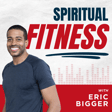
173. How to Get Out of Your Head and Live in Your Body with Philip Shepherd
Want to learn how to live in your body instead of just in your head?
In this episode of Spiritual Fitness, Eric Bigger talks with embodiment expert and bestselling author Philip Shepherd about moving beyond overthinking and fully integrating mind and body.
Philip shares how breaking free from cultural conditioning and reconnecting with your body can unlock deeper peace, truth, and presence.
You’ll discover practical steps to embody what you know, release mental overload, and experience life with more clarity and connection.
This episode unpacks:
- Why moving beyond overthinking leads to true presence
- What “hara” is and why your belly holds deep truth
- How to listen to the world through your body
- Breaking the habit of separating thinking from being
- How embodied living brings clarity and unlocks your gifts
About the guest:
Philip Shepherd is recognized as a leader in the global embodiment movement. He is the founder of The Embodied Present Process™ (TEPP), which offers a series of over 250 practices to help people ground themselves in the body’s wisdom. These practices are taught online as well as in workshops, retreats and Facilitators Trainings worldwide.
Philip is the author of two books, Radical Wholeness and New Self, New World, and co-author of Deep Fitness. The philosophy and practical applications of TEPP help people recognize how well-being is undermined by living in the head – a state of disembodiment our culture takes for granted. TEPP helps people recover the intimacy of true presence, in which they soften into the deeper intelligence of the body, find themselves rekindled with purpose, and discover a new kind of freedom and possibility in their lives. Find out more at EmbodiedPresent.com.
Shop IYLA: https://iylia.com/
Use promo code EB20 for IYLIA champagne, offering 20% off on orders up to $200
Check out Miracle Season’s collection: https://itsmiracleseason.co/collections/frontpage
Work with me: https://www.ericbigger.com/workwithme?utm_source=podcast&utm_medium=podcast&utm_campaign=work_with_m...
Connect with Simplified Impact: https://hubs.ly/Q02vvMJ90
